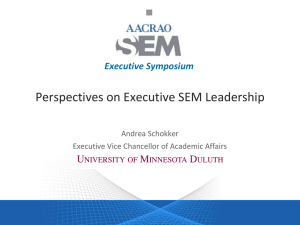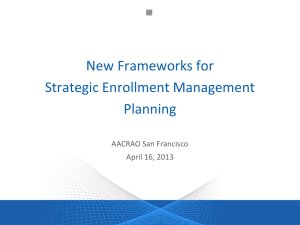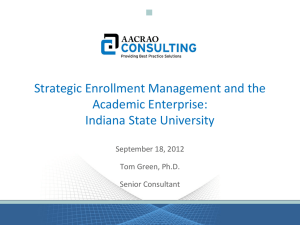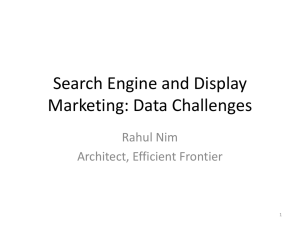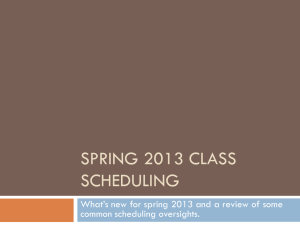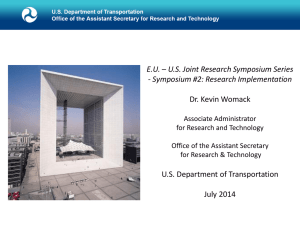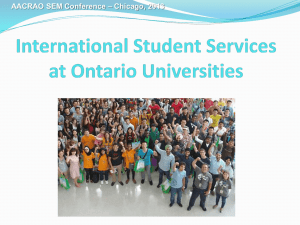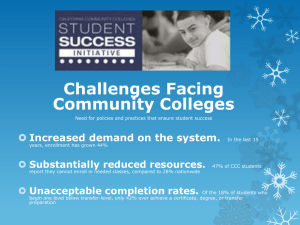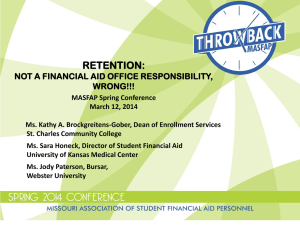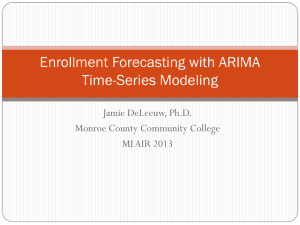this PowerPoint Presentation
advertisement
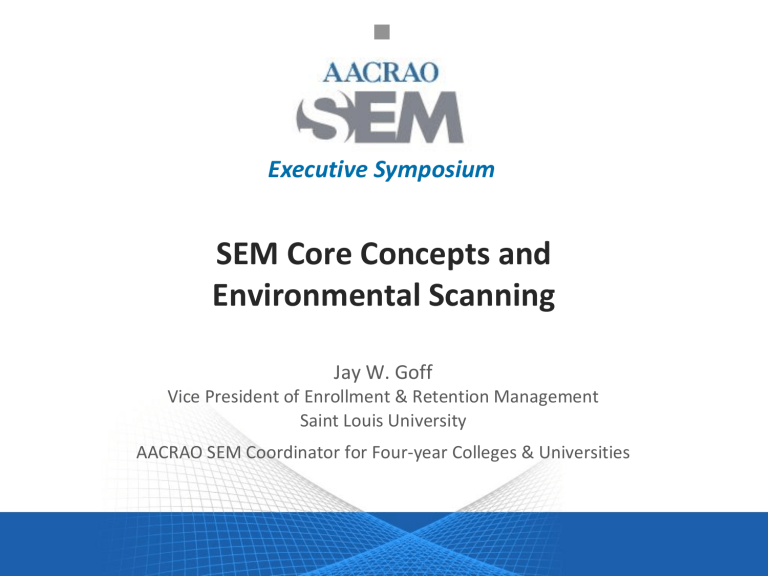
Executive Symposium SEM Core Concepts and Environmental Scanning Jay W. Goff Vice President of Enrollment & Retention Management Saint Louis University AACRAO SEM Coordinator for Four-year Colleges & Universities SEM Core Concepts and Environmental Scanning By promoting clarity of institutional mission from the perspective of student access and success, Strategic Enrollment Management (SEM) provides a thoughtful paradigm to focus institutional efforts on how to best meet student needs and support their educational attainment. Presentation will provide participants with an overview of key SEM concepts, including a focus on the student lifecycle continuum, setting institutional enrollment goals, data analysis, infrastructure analysis and the effective use of environmental scans. The resulting alignment of institutional mission, enrollment goals and targeted investments enables planning that is more strategic, in turn leading to improved outcomes for students, campus departments and the institution as a whole. AACRAO SEM Executive Symposium 2013 2 Overview 1. SEM Key Concepts 2. Environmental Scan 3. Student Life-Cycle Continuum 4. Data Analysis and Goal Setting 5. Developing the Infrastructure for SEM AACRAO SEM Executive Symposium 2013 3 Today’s Enrollment Manager “Successful senior enrollment managers have to operate simultaneously on multiple levels. They need to be up to date, even on the cutting edge of technology, marketing, recruitment, the latest campus practices to enhance student persistence, and financial aid practices.” SOURCE: THE ENROLLMENT MANAGEMENT REVIEW Volume 23, Issue 1 Fall, 2007, Editor: Don Hossler Associate Editors: Larry Hoezee and Dan Rogalski AACRAO SEM Executive Symposium 2013 4 AACRAO SEM Executive Symposium 2013 5 SEM: Helping Students Succeed at All Stages The Need to Provide Global Best Practices AACRAO SEM Executive Symposium 2013 7 Why Does Your Position Exist? The only person who likes change is a wet baby. Attributed to Mark Twain AACRAO SEM Executive Symposium 2013 9 Change is inevitable – except from a vending machine. Author unknown AACRAO SEM Executive Symposium 2013 10 Executive Symposium SEM Key Concepts What is Strategic Enrolment Management (SEM)? Strategic enrolment management is a concept and process that enables the fulfillment of institutional mission and students’ educational goals. Bontrager AACRAO SEM Executive Symposium 2013 12 Core Enrollment Management Principles 1. No Enrollment Effort is Successful without QUALITY Academic Programs 2. Recruitment and Retention is an On-going, Multi-year PROCESS with Strong Access to Research and DATA 3. Majority of Enrollments come from REGIONAL Student Markets 4. The Most Successful Recruitment Programs Clearly DIFFERENTIATE the Student Experience from Competitor’s Programs 5. The Most Successful Retention Programs Clearly Address Students’ Needs and Regularly ENGAGE Students in Academic and NonAcademic Programs SOURCE: Goff, 2005 AACRAO SEM Executive Symposium 2013 13 The Concept of Optimum Enrollment Race/ Ethnicity Course Delivery Mode Programs/ Courses Academic Profile Institutional Mission Undergrad/ Grad Geographic Origin Special Skills Program Capacity Bontrager AACRAO SEM Executive Symposium 2013 14 The Purposes of SEM are Achieved by… 1. Establishing clear goals for the number and types of students needed to fulfill the institutional mission 2. Promoting students’ academic success by improving access, transition, persistence, and graduation 3. Promoting institutional success by enabling effective strategic and financial planning 4. Creating a data-rich environment to inform decisions and evaluate strategies AACRAO SEM Executive Symposium 2013 15 The Purposes of SEM are Achieved by… 5. Improving process, organizational and financial efficiency and outcomes 6. Strengthening communications and marketing with internal and external stakeholders 7. Increasing collaboration among departments across the campus to support the enrolment program Bontrager AACRAO SEM Executive Symposium 2013 16 Executive Symposium Environmental Scan Challenges Facing Colleges and Universities “Economic, demographic, marketplace and technological trends are converging to cause an unprecedented time of change for higher education.” Tony Pals, National Association of Independent Colleges and Universities January 2013. http://diverseeducation.com/article/50905/ AACRAO SEM Executive Symposium 2013 18 2013 Enrollment Trends and Policies 1. 60% of admissions directors report not meeting May 1 undergraduate deposit goals (Gallup-Inside Higher Ed Survey 2013) 2. 2% decline in total graduate enrollments (CGS/GRE Survey 2013) 3. 38% decline in law school enrollments (LSAC 2013) 4. 16% choosing not-for-profit, private C&Us (NCES 2012) 5. Slight, but continued growth in international enrollments 6. New Federal Report Cards and Rating Systems 7. Increase in “phantom” applications / reliance on homepages for primary search information 8. Initial admission without HS transcripts policies 9. Online searches and applications are the standard 10. Stricter debt reporting and borrowing standards 11. Student employment as a retention strategy AACRAO SEM Executive Symposium 2013 19 Projected change in the number of high school graduates 2010 to 2019 © Copyright 2009, The Chronicle of Higher Education. Reprinted with permission. This material may not be posted, published, or distributed without permission from The Chronicle. High School Graduate Trends by Region SOURCE: WICHE, Knocking at Colleges Door 2013 AACRAO SEM Executive Symposium 2013 21 Challenge: changes in the college-bound student markets 1. 2. 3. 4. 5. 6. The Midwest and Northeast will experience a 4% to 10% decline in high school graduates between 2010 – 2017 (WICHE) Profile of college-bound students is rapidly becoming more ethnically diverse and female dominant (NCES, WICHE, ACT, College Board) The number of students interested in engineering, computer science, and natural science degrees growing, but remains low (ACT, CIRP) More full-time college freshmen are choosing to start at two-year colleges (IPED, NCES) More students are enrolling in more than one college at a time (National Student Clearinghouse) Future student market growth will include more students requiring financial aid and loans to complete a degree (WICHE) AACRAO SEM Executive Symposium 2013 22 2014 Targets for Increased Recruiting Efforts Target Students recruited with merit scholarships International students Transfer students Out-of-state students Full-pay students Public Private 53% 63% 50% 63% 53% 42% 61% 71% 65% 56% SOURCE: Inside Higher Ed http://www.insidehighered.com/news/survey/feeling-heat-2013-survey-college-and-university-admissions-directors#ixzz2je2dJvyD AACRAO SEM Executive Symposium 2013 23 Executive Symposium Student Life-Cycle Continuum Promoting Student Success: The Student Success Continuum Pre-College / Marketing / Recruitment Classroom experience Orientation Co-curricular support Degree & Goal attainment Student’s college career Admission Financial support Academic support Retention Bontrager AACRAO SEM Executive Symposium 2013 25 The Student Success Continuum Traditional Enrollment Perspective Pre-College / Marketing / Recruitment Classroom experience Orientation Co-curricular support Student’s college career Admission Financial support Academic support Degree & Goal attainment Retention Bontrager AACRAO SEM Executive Symposium 2013 26 The Student Success Continuum The SEM Perspective Pre-College / Marketing / Recruitment Classroom experience Orientation Co-curricular support Degree & Goal attainment Student’s college career Admission Financial Aid Academic support Retention Bontrager AACRAO SEM Executive Symposium 2013 27 Do You Know Corporate Partners and Hiring Organizations? Executive Symposium Data Analysis and Goal Setting SEM Planning Data Enrollment trends by program and student populations Assessing a changing environment and markets Net operating revenues and operating expenses Cost by student population Program demand and capacities Student retention and persistence rates Pricing strategies Financial aid policies Auxiliary income Enrollment management effectiveness 30 SEM is Moving Beyond the Fundamentals The Classic Admissions Funnel Prospects Inquiries Applicants Admits Enrollees Factors Most Noted in College Selection Process 1. Majors & Career Programs Offered 2. Location/Campus Characteristics 3. Cost/Affordability 4. Campus Size/Safety 5. Characteristics of Enrolled Students 6. Selectivity AACRAO SEM Executive Symposium 2013 31 Basic Enrollment Funnel Do not discount the value of funnel management and analysis AACRAO SEM Executive Symposium 2013 32 RECRUITMENT FUNNEL ACTIVITIES PRE-FUNNEL EARLY INTERVENTION, COMMUNITY SERVICE PROGRAMS SUMMER CAMPS, WEB REPLIES FEB - AUG AUG - JAN EARLY FUNNEL PSAT/ACT PLAN/TARGET MARKET SEARCHES ACT/SAT SCORES DIRECT MAIL TRAVEL PUBLICATIONS ON-CAMPUS PROGRAMS ADVERTISING MID FUNNEL ON- AND OFF-CAMPUS PROGRAMS DIRECT MAIL SCHOLARSHIP/FINANCIAL AID TRAVEL TELECOUNSELING PUBLICATIONS Inquire Apply JAN - MAY LATE FUNNEL ON- AND OFFCAMPUS PROGRAMS DIRECT MAIL TELECOUNSELING PUBLICATIONS SCHOLARSHIPS FINANCIAL AID Enroll Affordability and Access • Current Students - Average parent income - Family incomes below $50,000 - First generation college students - Low Income/Pell Grant eligible students • Graduation Statistics - Approximate total indebtedness - Average starting salary - Average salary after 10 years 34 Defining Core Competencies • Core competencies are particular strengths relative to other organizations in the industry which provide the fundamental basis for the provision of added value. • It is communication, an involvement and a deep commitment to working across organizational boundaries. Few organizations are likely to build clear leadership strengths in more than five or six fundamental competencies. • They culminate in the total value delivered by an organization. 35 Keys Identifying Competencies 1. Truly know your competitors - by degree program if possible 2. Strengths must be regularly agreed upon by faculty and institutional assessment data 3. The best competencies are externally verifiable 36 Executive Symposium Developing the Infrastructure for SEM Strategic Enrollment Management is about Student Success Making the entire college/university active in, and responsible for, recruiting, retaining and graduating students. AACRAO SEM Executive Symposium 2013 38 SEM Transition Model Structural Nominal Tactical Denial Strategic Denial Strategic Enrollment Trend: Achieving Down toOptimum Variable Building OptimumEnrollment Tactical Enrollment Messages: •Messages: “Thiscontrol “We are have isn’t subject to asour do easy something.” to enrollment as forces we thought.” beyond outcomes.” our • “Achieving control” “We need aoptimum silver bullet enrollment recruiting/marketing will require Structural • fundamental Action: “It’s just demographics/competition/ strategy” change and campus • Stable economy Limited participation.” organizational restructuring (pick one)” structure and funding •Action: Continue Top-level Ad hoc, EM withleadership short-term short-term strategies strategies with Nominal •Action: minimal Consistent Form enrollment planning a committee, and management assessment discuss options expertise cycle • Substantive (or expertiserestructuring isn’t listened to) • Strategic planning based on reliable data • Targeted funding Adapted from M. Dolence AACRAO SEM Executive Symposium 2013 39 SEM Process Framework Performed by Process steps Align institutional strategic plan with broad enrollment targets and desired mix of students Develop action steps, accountability, and metrics Implement action steps Monitor progress, Report results to campus and executive leadership Smaller group of staff and faculty adept at economics and data use Goals recommended by SEM Recruitment and Retention Councils; models developed by Data Team Mid-course adjustments New or revised goals Approve strategic goals and enrollment projection models Changes to goals Use data results to establish focused goals each for recruitment, retention, service, etc., and enrollment projection models Additional requests, clarifying questions Data gathering and assessment: Internal culture/ environment, student enrollment behaviors and scan of external environment Executive Leadership, SEM Steering Committee AACRAO SEM Executive Symposium 2013 Executive Leadership, SEM Steering Committee SEM councils and sub-committees Appropriate staff and faculty departments SEM Steering Committee, Chief Enrollment Officer 40 SEM Organizational Framework Executive Leadership Institutional strategic plan, approval and champions of strategic enrollment goals and initiatives SEM Steering Committee Long-term enrollment goals, securing the approval of strategies through appropriate institutional channels, communication with Executive Leadership Recruitment Council Retention Council Develop 3-4 strategic goals for new student recruitment; review and approve sub-committee action plans; recommend to SEM Steering Committee Develop 3-4 strategic goals for retention and graduation; review and approve sub-committee action plans; recommend to SEM Steering Committee 3-4 Sub-Committees 3-4 Sub-Committees Action plans, time lines and metrics for each strategic goal Action plans, time lines and metrics for each strategic goal Data Team Environment scanning, student enrollment behavior research, enrollment models, provide data to councils as needed AACRAO SEM Executive Symposium 2013 41 SEM Planning Framework Sustainable Enrollment Outcomes Tactics Strategies Enrollment Infrastructure Strategic Enrollment Goals Data Collection and Analysis Key Enrollment Indicators Institutional Strategic Plan AACRAO SEM Executive Symposium 2013 42 SEM Planning Framework Sustainable Enrollment Outcomes Tactics Strategies Enrollment Infrastructure Strategic Enrollment Goals Data Collection and Analysis Key Enrollment Indicators Clarity of institutional mission, vision, goals Core competencies Strategic direction Aggregate enrollment goals Institutional Strategic Plan AACRAO SEM Executive Symposium 2013 43 SEM Planning Framework Student categories: first year, transfer, dual enrollment, voc/tech, continuing ed, face-toface/online, certificate, etc. Sustainable Enrollment Outcomes Desired student groups: racial/ethnic diversity, academic ability, 1st gen Tactics Strategies Enrollment Infrastructure Strategic Enrollment Goals Data Collection and Analysis Key Enrollment Indicators Geographic origin: local, regional, Recruitment, retention, completion Institutional capacity Institutional Strategic Plan AACRAO SEM Executive Symposium 2013 44 SEM Planning Framework Sustainable Enrollment Outcomes Internal benchmarks: KEI numbers over the past 3-5 years Tactics Strategies Enrollment Infrastructure Strategic Enrollment Goals Data Collection and Analysis Key Enrollment Indicators Environmental scan − Demographics − Economics − Market opportunities − Competition Institutional research plan: designated reports and production schedule Institutional Strategic Plan AACRAO SEM Executive Symposium 2013 45 SEM Planning Framework Sustainable Enrollment Outcomes Tactics 5-10 year KEI targets Strategies Focus: the institution’s desired future Enrollment Infrastructure Strategic Enrollment Goals Based on: mission, data, and environmental scanning Data Collection and Analysis Key Enrollment Indicators Institutional Strategic Plan AACRAO SEM Executive Symposium 2013 46 SEM Planning Framework Sustainable Enrollment Outcomes Staffing: skill sets, strategic deployment Systems: policies, procedures, technology Tactics Strategies Enrollment Infrastructure Strategic Enrollment Goals Capacity for making effective enrollment decisions : positions, reporting lines, committees Data Collection and Analysis Key Enrollment Indicators Institutional Strategic Plan AACRAO SEM Executive Symposium 2013 47 SEM Planning Framework Increase new students of specified types Sustainable Enrollment Outcomes Increase retention rates, specifically by student types Tactics Strategies Enrollment Infrastructure Strategic Enrollment Goals Data Collection and Analysis Utilize emerging technologies Financial aid/scholarships Academic programs: mix and delivery systems Key Enrollment Indicators Institutional Strategic Plan AACRAO SEM Executive Symposium 2013 48 SEM Planning Framework Marketing/branding initiatives Sustainable Enrollment Outcomes Academic program review Multilingual recruitment materials Tactics Strategies Enrollment Infrastructure Strategic Enrollment Goals Data Collection and Analysis Key Enrollment Indicators Institutional Strategic Plan Targeted interventions for students in high risk courses Enhanced academic advising Streamlined admission procedures Purchase a new CRM system AACRAO SEM Executive Symposium 2013 49 SEM Planning Framework Sustainable Enrollment Outcomes Consistently meeting goals over the long term − Enabling more effective campus-wide planning Tactics − Revisions to the institutional strategic plan Strategies − Academic planning: curriculum, faculty needs Enrollment Infrastructure Strategic Enrollment Goals Data Collection and Analysis Key Enrollment Indicators − Facility planning − Financial planning Achieving the institution’s desired future Institutional Strategic Plan AACRAO SEM Executive Symposium 2013 50 Saint Louis University’s SEM PLAN: What will Billikens Look Like in 2018? Total Domestic Degree Seeking Enrollment 2013 0 1-9 10-25 26-149 150+ Total International Student Enrollment Fall 2013 ISLANDS N O RW AY ICELAND FIN LAND EST. UNITED LAT. LITH. DENMARK RUSSIA BELARUS (U IRELAND N Island of Newfoundland GERMANY BE L GIUM CZECH RE UKR AINE P. S L O V AKIA LUX. S LIECH. MOLDOVA A U STRIA SLO VENIA C RO ATIA MO N A C O SAN MARI N O BOS. & HER. I GEORGIA BULGARIA ANDORRA ALB. M ARMENIA AZER KYRGYZSTAN B AI JAN N TURKMENISTAN K TAJIKISTAN JAPAN Indian claim MA L T A TUNISIA CYP RUS 1972 Line of Cont SYRIA LEB. rol Line of Actual Cont r ol JORDAN BHUTAN THE BAHAMAS BAHRAIN QATAR MEXICO OMAN ARAB A CUBA OMAN DOMINICAN REPUBLIC A HAITI ANTIG S T . VI N CEN T AND THE GRE N ADINES CAPE VERDE CA B AR B ADOS COSTA RICA VIETNAM BURKINA FASO THE GAMBIA GUINEA-BISSAU LAOS ERITREA CHAD SENEGAL S T . LUCIA BURMA MALI UA DOMINI I MAURITANIA ST . KIT T S AND NEVIS Puerto Rico ( U .S.) GUINEA SUDAN DJIBOUTI CAMBODIA BENIN O PA CÔTE D'IVOIRE SIERRA LEONE GUYANA French Guiana (FRA N CE) T OGO CAMEROON LIBERIA CENTRAL AFRI CAN REPUBLIC SOMALIA BRUNEI SURINAME EQUATORIAL GUINEA A SAO TOMEAND PRINCIPE REP. OF THE CONGO A A PAPUA NEW GUINEA A N GO L A (Cabinda) BRAZIL PERU SO LOMON ISLANDS EAST TIMOR ANGOLA TU VA LU COMOROS ZAMBIA VAN UATU BOLIVIA MOZAMBIQUE N AMIBIA PARAGUAY MA DA GASCAR BO TSWA N A LESOTHO SWAZILAND SOUTH AFRICA URUGUAY R A Official Fall 2013 Census Data [updated 10/2013] 1092 Students Representing 86 Countries China 572 Spain 155 Saudi Arabia 40 Canada 31 India 17 Egypt 15 South Korea 15 Germany 15 Brazil 11 FIJI SEM at SLU • • • • • Mission Strategic Plan Vision for Enrollment Profile Values Goals AACRAO SEM Executive Symposium 2013 54 SLU’s 2018 Strategic Enrollment Vision: Objectives and Targets for Traditional Undergraduates I. Increase the Academic Profile of the Freshman Class II. Increase the Diversity of the Undergraduate Student Body III. Maintain a Strong Catholic Student Population IV. Optimize Existing University Capacities to Generate More Net Revenue from the Academic Enterprise V. Increase Student Persistence and Success Levels Equal to the 4th Quartile of the Top 50 US Universities 56 SLU’s Desired New Undergraduate Student Profile Scorecard Enrollment Profile Metric Goal 2012 Benchmark 2013 ACT Upper 10% in nation (27.8) 27.2 27.6 GPA +3.5/4.0 3.78 3.85 U.S. Geographic 50 States Represented 42 44 International 10-15% 3% 4% Catholic 45-50% 54% 56% Underrepresented Ethnicity 13-15% 13% 15% Transfer 15-20% 19% 16% Military/Veteran (total enrollment) 5-10% 2.5% 3% Enrollment Success Metric Goal 1-2 Year Retention Rate 90% 6 Year Retention/Graduation Rate 80% 2012 Benchmark 2013 88% 88% 70% 70% VP Enrollment and Retention Management 57 Executive Symposium QUESTIONS Jay W. Goff Vice President of Enrollment & Retention Management Saint Louis University AACRAO SEM Coordinator for Four-year Colleges & Universities 314-977-8191 goffjw@slu.edu
